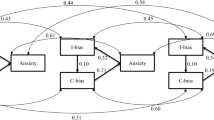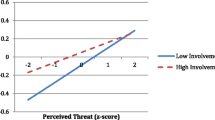Abstract
Overestimation of threat and underestimation of coping have been frequently reported amongst anxious adults and children. The current study examines the longitudinal relationship between mothers’ anxious cognitions and expectations about their child, and children's anxious cognitions. 54 children (aged 10–11 years) and their mothers reported on their interpretation of ambiguous scenarios at two time points. Mothers also reported on their expectations about their child's reaction to ambiguous situations. Significant cross-sectional associations were found between mother and child anticipation of distress. Associations were most consistent between mothers’ expectations and children's cognitions. Furthermore, based on regression analyses, mothers’ expectations predicted change in children's anxious cognitions over time. Evidence for a reciprocal relationship, that child cognitions predict change in mothers’ expectations, was found for girls. The results provide empirical support for potential influences on the development of children's ‘anxious cognitive style,’ and suggest targets for preventing and reducing maladaptive cognitions in children.
Similar content being viewed by others
References
Alloy, L. B. (2001). The developmental origins of cognitive vulnerability to depression: Negative interpersonal context leads to personal vulnerability. Cognitive Therapy and Research, 25, 349–351.
Alloy, L. B., Abramson, L. Y., Tashman, N. A., Berrebbi, D. S., Hogan, M. E., Whitehouse, W. G., et al. (2001). Developmental origins of cognitive vulnerability to depression: Parenting, cognitive, and inferential feedback styles of the parents of individuals at high and low cognitive risk for depression. Cognitive Therapy and Research, 25, 397–423.
Andrews, G., Stewart, G. W., Allen, R., & Henderson, A. S. (1990). The genetics of six neurotic disorders: A twin study. Journal of Affective Disorders, 19, 23–29.
Barrett, P. M., Dadds, M. M., & Rapee, R. M. (1996). Family treatment of childhood anxiety: A controlled trial. Journal of Consulting and Clinical Psychology, 64, 333–342.
Barrett, P. M., Rapee, R. M., Dadds, M. M., & Ryan, S. M. (1996). Family enhancement of cognitive style in anxious and aggressive children. Journal of Abnormal Child Psychology, 24, 187–203.
Beck, A. T., Emery, G., & Greenberg, R. L. (1985). Anxiety disorders and phobias: A cognitive perspective. New York: Basic Books.
Bogels, S. M., van Dongen, L., & Muris, P. (2003). Family influences on dysfunctional thinking in anxious children. Journal of Infant and Child Development, 12, 243–252.
Brewin, C. R., Andrews, B., & Furnham, A. (1996). Intergenerational links and positive self-cognitions: Parental correlates of optimism, learned resourcefulness, and self-evaluation. Cognitive Therapy and Research, 20, 247–263.
Butler, G., & Mathews, A. (1983). Cognitive processes in anxiety. Advances in Behavior Research and Therapy, 5, 51–60.
Cobham, V. E., Dadds, M. M., & Spence, S. H. (1999). Anxious children and their parents: What do they expect? Journal of Clinical Child Psychology, 28, 220–231.
Cole, D. A., Jacquez, F. M., & Maschman, T. L. (2001). Social origins of depressive cognitions: A longitudinal study of self-perceived competence in children. Cognitive Therapy and Research, 25, 377–395.
Cole, D. A., Maxwell, S. E., & Martin, J. M. (1997). Reflected self-appraisals: Strength and structure of the relation of teacher, peer and parent ratings to children's self-perceived competencies. Journal of Educational Psychology, 89, 55–70.
Cooley, C. H. (1902). Human nature and the social order. New York: Scribner.
Creswell, C. S. (2004). The development of anxious cognitions in children. Unpublished doctoral dissertation, University of London, London.
Creswell, C., & O’Connor, T. (in press). ‘Anxious cognitions’ in children: An exploration of associations and mechanisms. British Journal of Developmental Psychology.
Creswell, C. A., Schneiring, C., & Rapee, R. M. (2005). Threat interpretation in anxious children and their mothers: Comparison with nonclinical children and the effects of treatment. Behaviour Research and Therapy, 43(10), 1375–1381.
Dadds, M. M., & Barrett, P. M. (1996). Family processes in child and adolescent anxiety and depression. Behaviour Change, 13, 231–239.
Eley, T. C., & Stevenson, J. (1999). Exploring the covariation between anxiety and depression symptoms: A genetic analysis of the effects of age and sex. Journal of Child Psychology and Psychiatry, 40, 1273–1284.
Feigon, S. A., Waldman, I. D., Levy, F., & Hay, D. A. (1997). Genetic and environmental influences on various anxiety disorder symptoms in children. Behavior Genetics, 27, 588.
Fincham, F. D., & Cain, K. M. (1986). Learned helplessness in humans: A developmental analysis. Developmental Review, 6, 301–333.
Garber, J., & Flynn, C. (2001). Predictors of depressive cognitions in young adolescents. Cognitive Therapy and Research, 25, 353–376.
Kaslow, N. J., Rehm, L. P., & Siegel, A. W. (1984). Social-cognitive and cognitive correlates of depression in childhood. Journal of Abnormal Child Psychology, 12, 605–620.
Kortlander, E., Kendall, P. C., & Panichelli-Mindel, S. M. (1997). Maternal expectations and attributions about coping in anxious children. Journal of Anxiety Disorders, 11, 297–315.
Krohne, H. W., & Hock, M. (1991). Relationships between restrictive mother-child interactions and anxiety of the child. Anxiety Research, 4, 109–124.
Last, C. G., Hersen, M., Kazdin, A. E., Francis, G., & Grubb, H. J. (1987). Psychiatric illness in the mothers of anxious children. American Journal of Psychiatry, 144, 1580–1583.
Last, C. G., Hersen, M., Kazdin, A. E., Orvaschel, H., & Perrin, S. (1991). Anxiety disorders in children and their families. Archives of General Psychiatry, 48, 928–936.
Mathews, A., Richards, A., & Eysenck, M. (1989). Interpretation of homophones related to threat in anxiety states. Journal of Abnormal Psychology, 98, 31–34.
Mead, G. H. (1934). Mind, self and society. Chicago: University of Chicago Press.
MacBrayer, E. K., Milich, R., & Hundley, M. (2003). Attributional biases in aggressive children and their mothers. Journal of Abnormal Psychology, 112, 698–708.
Miller, S. A. (1988). Parents’ beliefs about children's cognitive development. Child Development, 59, 259–285.
Muris, P., Luermans, J., Merckelbach, H., & Mayer, B. (2000). ‘Danger is lurking everywhere’. The relation between anxiety and threat perception abnormalities in normal children. Journal of Behavior Therapy & Experimental Psychiatry, 31, 123–136.
Oliver, J. M., & Berger, L. S. (1992). Depression, parent-off-spring relationships and cognitive vulnerability. Journal of Social Behavior and Personality, 7, 415–429.
Rapee, R. M. (2001). The development of generalized anxiety. In M. W. Vasey & M. M. Dadds (Eds.), The developmental psychopathology of anxiety (pp. 1045–1095). New York: Oxford University Press.
Robinson, N. S., Garber, J., & Hilsman, R. (1995). Cognitions and stress: Direct and moderating effects on depressive versus externalising symptoms during the junior high school transition. Journal of Abnormal Psychology, 104, 453–463.
Rubin, K. H., Cheah, C. S. L., & Fox, N. (2001). Emotion regulation, parenting and display of social reticence in preschoolers. Early Education and Development, 12, 97–115.
Seligman, M. E. P., Peterson, C., Kaslow, N. J., Tanenbaum, R. L., Alloy, L. B., & Abramson, L. Y. (1984). Attributional style and depressive symptoms among children. Journal of Abnormal Psychology, 93, 235–238.
Shrout, P. E., & Fleiss, J. L. (1979). Intraclass correlations: Uses in assessing rater reliability. Psychological Bulletin, 8, 420–428.
Stark, K. D., Schmidt, K. L., & Joiner, T. E. (1996). Cognitive triad: Relationship to depressive symptoms, parents’ cognitive triad, and perceived parental messages. Journal of Abnormal Child Psychology, 24, 615–631.
Teti, D. M., & Gelfand, D. M. (1991). Behavioral competence among mothers of infants in the first year: The mediational role of maternal self-efficacy. Child Development, 62, 918–929.
Turk, E., & Bry, B. H. (1992). Adolescents’ and parents’ explanatory styles and parents’ causal explanations about their adolescents. Cognitive Therapy and Research, 16, 349–357.
Turner, S. M., Beidel, D. C., Roberson-Nay, R., & Tervo, K. (2003). Parenting behaviors in parents with anxiety disorders. Behaviour Research and Therapy, 41, 541–554.
Verhulst, F. C. (2001). Community and epidemiological aspects of anxiety disorders in children. In W. K. Silverman & P. D. A. Treffers (Eds.), Anxiety disorders in children and adolescents: Research, assessment and intervention (pp. 273–292). Cambridge: Cambridge University Press.
Weissman, M. M., Leckman, J. F., Merikangas, K. R., Gammon, D., & Prusoff, B. A. (1984). Depression and anxiety disorders in parents and children. Archives of General Psychiatry, 41, 845–852.
Wood, J. J., McLeod, B. D., Sigman, M., Hwang, W., & Chu, B. C. (2003). Parenting and childhood anxiety: theory, empirical findings, and future directions. Journal of Child Psychology and Psychiatry, 44, 134–151.
Acknowledgements
We would like to thank Islington Education Authority, the participating schools, the children and their parents for all their help. We would also like to thank Norah Breslin, Loanda Cullen, David Younger, Vicki Preston-Ladd and Katie Law for their assistance.
Author information
Authors and Affiliations
Corresponding author
Rights and permissions
About this article
Cite this article
Creswell, C., O’Connor, T.G. & Brewin, C.R. A Longitudinal Investigation of Maternal and Child ‘Anxious Cognitions’. Cogn Ther Res 30, 135–147 (2006). https://doi.org/10.1007/s10608-006-9021-1
Published:
Issue Date:
DOI: https://doi.org/10.1007/s10608-006-9021-1




